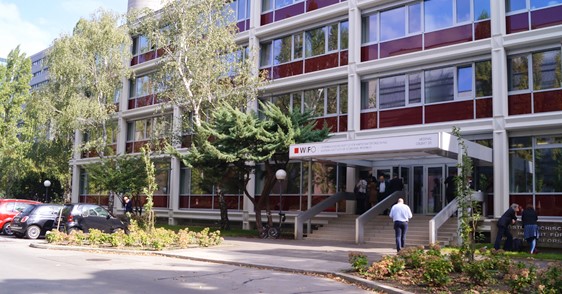
Course Venue: WIFO
This one-week intensive course will introduce participants to the equations and data structure of TERM -- a multiregional CGE model of a single country -- and provide them with extensive hands-on experience with the GEMPACK software used to solve CGE models.
For 2020 the course will be presented during 7-11 September at the Austrian Institute of Economic Research (WIFO) in Vienna.

Course Venue: WIFO
Following the TERM course, from 14-15 September, there will be a 2-day Advanced GEMPACK course also at WIFO.
TERM (The Enormous Regional Model) is a multiregional CGE model of a single country, which is "bottom-up" -- it treats each region as a separate economy. Two key features of TERM are: (a) its ability to solve quickly with a large number of regions or sectors, and (b) its database construction methodology, which allows a multiregional database to be constructed quickly, even with quite limited regional data.
The first, Australian, version of TERM distinguished 144 sectors and 57 regions. More recently, its master database has been extended to represent 182 sectors in 205 statistical sub-divisions (SSDs), so that urban areas, water catchment areas and tourism regions may all be distinguished accurately. The high degree of regional detail makes TERM a useful tool for examining the regional impacts of shocks (especially supply-side shocks) that may be region-specific. Finally, TERM has a particularly detailed treatment of transport costs and is naturally suited to simulating the effects of improving particular road or rail links.
Versions of TERM have been prepared for Brazil, China, Finland, Indonesia, Italy, Japan, Korea, New Zealand, Poland, South Africa, Sri Lanka, Sweden and USA. The course material is mainly based on the South African version but would apply with small modification to other versions of TERM.
Read more about the TERM model.
The course runs from Monday to Friday 9am to 5.30pm. During the first 3.5 days, about equal time is spent on lectures explaining CGE theory as applied to TERM, and on lab sessions designed to teach how to compute and explain simulation results. Then, participants form into groups, each focused on running and analysing different simulations. During the last session, the groups present and explain their simulation results.
The course should appeal to those needing background in CGE modelling in order to work with, or understand results from a typical multi-regional CGE model, and to those wishing to learn CGE modelling using GEMPACK.
Course participants receive a folder, containing
At the end of the course participants receive DVDs or USB keys, containing
As with our introductory Practical GE Modelling Course, previous hands-on experience in solving GE models is not required. Again we require that course participants have:
Nevertheless this course is more technically demanding than the Practical GE Modelling course, and we expect that many participants will have previous exposure to CGE modelling. To avoid boring those who have already learnt the basics, we have chosen to present a slightly different set of techniques from those used in the Practical GE course.
If you have not worked with GEMPACK before, you should download and work through the MINIMAL course material. Although far simpler, the MINIMAL model and course use similar notation and software to TERM. To go further, you should:
Please note that participants need to bring their own laptops and install GEMPACK before the course.
Fees cover:
The fee does not cover accommodation, breakfast or dinner.
Students, or multiple attendees from one institution, may be be able to negotiate a discount.
The fee covers course materials (including software), morning and afternoon teas and 5 lunches. It does not cover accommodation, breakfast or dinner.
Register for the course or ask a question using this form.
Registration and Payment must be completed by 21 August 2020.
Louise Pinchen
Executive Officer and GEMPACK Business Manager
Centre of Policy Studies
Victoria University
Phone +61 3 9919 1877
See also:
Main Training Courses page
Previous course photos
TERM webpage